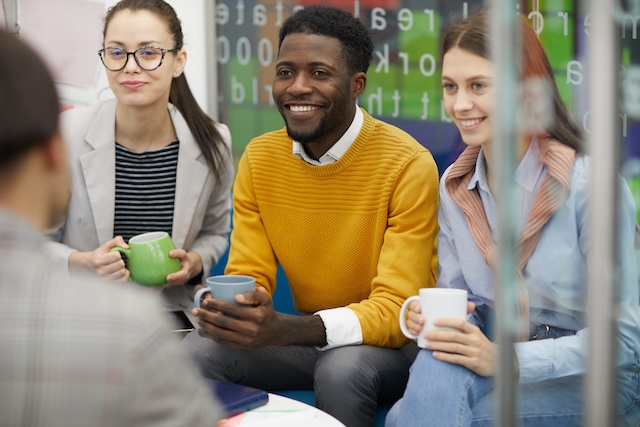The competition for skilled workers remains fierce. Businesses of all sizes are grappling with talent shortages, demanding a strategic shift in attracting, assessing, and retaining top employees. Navigating the contemporary job market requires a strategic and adaptable approach to hiring. The process of successfully recruiting and onboarding employees has evolved significantly, propelled by technological advancements, shifting workforce preferences, and the lasting impact of global events. Those who succeed in the hiring game understand it’s not just about filling open positions; it’s about building a winning team. A team that thrives fosters innovation and propels the company forward.
This comprehensive guide equips you with the tools and insights needed to navigate the 2024 hiring landscape.
We provide our top tips that will help you streamline your hiring process.
12 Strategies to Hire Employees Successfully in 2024
Attracting and selecting the right talent for your organization involves multiple strategies, from defining a role to offering the right benefits and treating candidates with respect. Here are 12 strategies to hire employees successfully in 2024.
1. Define your ideal candidate profile
Defining your ideal candidate profile is critical for successful hiring and will make the process more efficient. Before initiating the search process, meticulously outline the required skills, experiences, and personal attributes essential for the role. This involves considering technical expertise, industry-specific knowledge, soft skills, and cultural fit. Delve into the nuances of the position to pinpoint the qualities that will contribute to success within your organization. Whether it’s adaptability, creativity, or a collaborative mindset, clearly articulating these criteria will guide your recruitment efforts and ensure you attract candidates who align with your company’s values and objectives.
2. Craft compelling job descriptions
In 2024, crafting compelling job descriptions is more crucial than ever. Gone are the days of generic postings; now, they must be clear, concise, and engaging to attract the right candidates. These descriptions should not only outline the role’s purpose and responsibilities but also convey the potential impact the successful candidate will have on the team and the organization as a whole. Incorporate relevant keywords to optimize searchability. Moreover, use the job description as an opportunity to highlight your company culture, values, and what makes it a special place to work. By presenting an authentic and appealing portrayal of your organization, you’ll attract a diverse and qualified talent pool that resonates with your mission and vision, setting the stage for successful recruitment and long-term employee satisfaction.
3. Leverage diverse recruitment channels
Leveraging diverse recruitment channels is imperative to reach a vast pool of qualified candidates. Expand beyond traditional job boards by utilizing professional networking platforms like LinkedIn, attending industry events and job fairs, and forging partnerships with universities and colleges renowned for relevant programs. Moreover, explore niche job boards tailored to specific demographics or skill sets to tap into specialized talent pools. A multi-pronged approach maximizes visibility and engagement, increasing the likelihood of attracting top-tier candidates who align with your organization’s needs and values. By diversifying your recruitment strategy, you enhance the chances of finding the perfect fit for your team while staying ahead in the competitive job market.
4. Utilize artificial intelligence (AI)
Incorporating artificial intelligence (AI) into recruitment processes offers substantial benefits. AI-driven platforms leverage predictive analytics to identify top candidates, automate repetitive tasks, and customize the candidate experience. These tools streamline resume screening, candidate sourcing, and interview scheduling, expediting the hiring process. Moreover, AI minimizes unconscious biases in decision-making, ensuring fairer evaluations. By investing in AI-driven recruitment platforms, you can significantly reduce time-to-hire, improve efficiency, and enhance the quality of hires.
5. Refine your interview process
The interview process is an important step in the relationship with the candidate. In 2024, ditch the outdated formats and prioritize a candidate-centric approach. Here’s how to revamp your strategy:
- Skills-based assessments: Move beyond conventional interviews. Incorporate take-home assignments that mimic real-world scenarios or request case studies. This allows candidates to showcase their practical abilities and problem-solving skills.
- Transparency is key: Be upfront about the role’s requirements and company expectations. Doing so sets clear benchmarks and allows candidates to self-assess their fit.
- Respect the candidate: Remember, candidates are interviewing you, too! Create a welcoming environment and allow ample time for them to respond to and ask questions. This demonstrates respect for their time and efforts and fosters a positive impression of your company.
6. Focus on behavioral interviewing
Behavioral interviewing ditches hypothetical questions for a dive into a candidate’s past experience. Instead of “How would you handle a difficult client?” you ask, “Tell me about a time you faced a challenging customer.” Focusing on specific situations (e.g., a tense negotiation or a looming deadline) gives you a richer picture of their skills. Did they stay calm under pressure? Did they think creatively to solve the problem? Their past actions become a springboard to assess how they might handle similar situations in your role. This approach helps predict future performance by uncovering their problem-solving strategies, decision-making tendencies, and work ethic showcased in real-life scenarios.
7. Ask about the candidate’s goals and ambitions
Understanding a candidate’s long-term plans can be a powerful tool in your hiring decisions. Here’s why:
- Longevity potential: Frequent recruitment is costly and time-consuming. You can assess a candidate’s long-term fit by gauging a candidate’s desire to stay with the company. Someone who sees your company as a stepping stone might not be the best choice for a role requiring sustained commitment.
- Alignment with company culture: Ambition isn’t just about wanting a promotion. Ask questions that reveal the candidate’s motivations. Are their goals aligned with your company culture? Someone passionate about innovation might be an excellent fit for a fast-paced startup but a mismatch for a more traditional environment.
- Work ethic and drive: Ambition is a strong indicator of work ethic. Candidates with clear goals often demonstrate a drive to learn, grow, and achieve. During the interview, explore their past experiences that showcase this drive. How did they approach challenges? Did they take the initiative?
8. Look at the candidate’s hard and soft skills
Evaluating both hard and soft skills is essential to finding the perfect fit for your role.
- Hard skills: Hard skills are technical skills and knowledge specific to a job. Review the job description and create a list of required hard skills. During the interview process, assess the candidate’s experience through past projects, work and volunteer experience, certifications, and technical skills tests (if relevant). Can they demonstrate proficiency in the essential hard skills for the role?
- Soft skills: Soft skills are interpersonal skills that contribute to an individual’s effectiveness in the workplace. Communication, teamwork, problem-solving, and adaptability are all crucial soft skills. Use behavioral interviewing techniques to uncover a candidate’s soft skills. Ask them to describe past situations that required these skills and how they approached them. Their responses will reveal whether their traits are the right fit for the role and your organization.
- Matching skills and needs: Don’t just assess skills in isolation. Consider how a candidate’s skillset aligns with the specific needs of the role and your company culture. The ideal candidate will possess the right combination of hard and soft skills that make them a strong fit for the position and your team.
9. Prioritize employer branding
In today’s competitive talent market, your company brand isn’t a bonus; it’s a necessity. A strong employer brand acts like a magnet, attracting the best and brightest. Conversely, a poor employer brand can negatively affect your hiring strategy, especially if it results in bad reviews on sites like Glassdoor. So, how do you build a great one?
- Showcase your culture and values: Let the world know what your company stands for. What are your core values? What’s the work environment like? Are you fun and collaborative or focused and intense? Highlight these aspects on social media and your careers page.
- Employee stories are golden: People connect with people. Share stories from your employees about their experiences, passions, and why they love working for your company. Authenticity resonates with potential hires.
- Benefits beyond the paycheck: Salary is important but not everything. Promote your unique benefits package, work-life balance initiatives, and professional development opportunities. Show potential candidates why your company is a great place to build a career.
10. Offer competitive compensation and benefits
Well-designed compensation and benefits packages are a significant draw for top talent in a competitive job market. To stand out, you need to be strategic. Here’s how:
- Market research: Don’t guess what a competitive offer looks like. Conduct thorough research to understand industry standards for similar roles in your location. Resources like salary comparison websites and industry reports can be helpful.
- Competitive salary: This is the foundation. Offer a base salary that aligns with your research and is attractive to qualified candidates. Remember, a competitive salary isn’t always the highest—consider factors like location and cost of living.
- Benefits package: Think beyond just health insurance. A well-rounded benefits package can include things like paid time off, parental leave, retirement plans, wellness programs, career development, and tuition reimbursement. Consider what would be valuable to your target talent pool.
11. Embrace remote and hybrid work models
The remote work revolution is here to stay. Top talent in 2024 prioritizes flexibility and work-life balance. Offering remote or hybrid work models allows you to:
- Attract a wider talent pool: Cast a net beyond geographical limitations and target exceptional and diverse candidates regardless of location.
- Cater to evolving needs: Respond to the modern workforce’s desire for flexibility. This fosters a happy and productive work environment and also encourages a greater variety of candidates to apply
- Embrace technology: Invest in tools facilitating seamless communication and collaboration, ensuring a smooth transition to a remote or hybrid structure.
By embracing these models, you’ll unlock a competitive edge in attracting top talent who thrive in flexible work arrangements. This positions you as a forward-thinking company as you demonstrate your commitment to employee well-being.
12. Invest in candidate experience
Investing in candidate experience isn’t just courteous; it’s smart business. The hiring process shouldn’t feel like a black hole for applicants. Invest in creating a positive experience from start to finish. Here’s how:
- Communication is key: Keep candidates informed throughout the process. Let them know when to expect updates and provide clear timelines.
- Be responsive: Respond promptly to inquiries and application submissions. A timely reply shows respect for their time and effort.
- Respect your declined candidates: A candidate that’s not your choice for one role could be right for another down the road and may share their application experience with others. Show your respect for them by offering them ways to stay connected to your organization and to continue their job search through a candidate experience program.

By prioritizing these aspects, you’ll gain a reputation for treating candidates well. This builds brand loyalty and increases the likelihood of attracting top talent who will advocate for your company. Remember, a positive candidate experience can turn disappointed applicants into future brand ambassadors.
How to Hire Employees: FAQs
What is the best way to hire employees?
The best way to hire employees involves a structured approach. Begin by defining the job requirements clearly and crafting a compelling job description. Utilize multiple recruitment channels, including job boards, social media, and employee referrals, to attract a diverse pool of candidates. Screen resumes to identify qualified candidates and conduct structured interviews to assess their skills, qualifications, and cultural fit. Check references to gain insights into their past performance and professionalism. Consider administering skills assessments or tests as needed. Maintain transparent communication with candidates throughout the process and make a well-informed hiring decision based on all relevant information gathered.
How do I create a hiring plan?
A hiring plan is your roadmap to finding the right talent. Here’s a quick guide to get you started:
- Needs assessment: Identify open positions and future needs. Talk to managers about their requirements and budget.
- Goals and timeline: Set clear goals for each hire (e.g., fill by Q2) and define a realistic timeline for recruitment.
- Candidate profile: Craft an ideal candidate profile outlining skills, experience, and cultural fit.
- Recruitment strategy: Choose the best way to find candidates (job boards, internal referrals, etc.). Consider budget and reach.
- Interview process: Outline a structured interview process with clear evaluation criteria.
- Onboarding: Plan how you’ll integrate new hires into your team and company culture.
How do you know if you need to hire more employees?
Determining whether to hire someone for an open position involves assessing various factors. Firstly, evaluate if the workload or demand for the role justifies hiring. Consider whether current staff can handle the workload or if additional expertise is required. Assess the impact of the vacancy on team productivity and business goals. Analyze the cost implications of hiring, including salary, benefits, and training expenses.
How to Hire Employees: Conclusion
Remember, when it comes to recruitment, taking the time to establish and practice effective hiring processes will turn a challenging task into a rewarding experience that will help you find the perfect professional. From determining your organization’s needs to offering a positive candidate experience to being an employer of choice, putting the suggested strategies to work will help you attract and hire the right talent. And remember, just because a candidate isn’t the right fit for one role, this doesn’t mean they won’t be able to benefit your company. With this in mind, when it comes to unsuccessful candidates, it’s always a good idea to offer candidate experience resources to help applicants with their job search. This can establish a positive bond with candidates and help build a useful talent pool for future use.
INTOO helps employers of all sizes with cost-effective solutions for every stage of the employee lifecycle, including candidate experience, career development, and outplacement services. Contact us to learn how we can make a difference for you and your employees.












